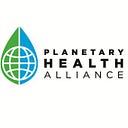Hope and Action in a Time of Emergencies
By Dr. Samuel S. Myers, Principal Research Scientist at the Harvard T.H. Chan School of Public Health and Faculty Director of the Planetary Health Alliance
We are in the midst of two emergencies. Our response to one provides hope for the other. Neither emergency is a surprise. For decades, scientists and public health officials have warned that our behaviors, around the world, were putting us at high risk. We have known that millions of lives are in jeopardy, that protecting ourselves would require a significant restructuring of how we do what we do. In both cases there have been recent and urgent warnings, and even with the emergencies in full swing and claiming lives across the globe, some national leaders have been quick to spread doubt, to label the emergencies as hoaxes, and to put the brakes on rapid coordinated mitigation efforts.
The first emergency, the Covid-19 pandemic, has exploded into public consciousness. We have seen decades of warning that human incursions into wildlife habitat, bushmeat hunting and consumption, the live animal trade, and other behaviors put us at risk for increasing exposure to zoonotic pathogens from wild animal populations. Add to this our expanding addiction to international air travel and our weakened public health systems and we have the means for the emergence and rapid spread of novel deadly pathogens. The SARS outbreak in 2002 showed us that bringing together diverse wildlife species in close proximity with each other and with dense human populations in live animal markets is a particularly dangerous recipe, and warnings of future outbreaks associated with such practices were both extensive and unheeded. Now, as predicted, the pandemic is upon us. With a few notable exceptions, we have been largely unprepared, and we are paying the costs in deaths, illness, social instability, and economic chaos. Our hearts go out to those suffering the devastating losses of lives and livelihoods.
The other emergency we face puts more lives at risk in the long run, intensifies with every passing day, and offers no herd immunity, no expiration date. Like Covid-19, it threatens to upend the lives of some people more than others, particularly the poor, and spotlights issues of equity and justice. And like Covid-19, it will take a dramatic restructuring of the norms of society to overcome it. The second emergency, the planetary health emergency, is our destruction of Nature, the dismantling of our life support systems — the climate system, biodiversity, land cover, fresh water, clean air, fertile soil. By degrading the quality of our food, air, and water; changing our exposure to infectious diseases and extreme weather events; and even jeopardizing the habitability of the places we live, our dismantling of Earth’s natural systems is now threatening every dimension of health for all people — now and in the future. And while alarms about Covid-19 echo across the globe, the planetary health emergency remains largely invisible.
But there is much for us to be hopeful about despite the grimness of today’s news. Two months ago, the pace, scale, and coordination of the seismic shifts in global human behavior that we are currently seeing was unimaginable. Addressing the planetary health emergency will require a similarly urgent, coordinated, and comprehensive response: We have no choice but to reconsider and restructure our existence on this planet — what we eat and how we produce it; how we generate our energy; the way we manufacture goods and design our cities; and even the stories we share about what makes us happy, what it means to live a good life, and our place in the world. But today we are seeing something we have never seen before. People are coming together to address a collective threat, radically altering their behaviors, often at significant personal cost, and exhibiting pervasive acts of altruism despite enforced physical isolation. For the first time, it seems feasible that urgent, global, coordinated activity to protect ourselves and all life on Earth is within our grasp. Combatting this second emergency will require individual behavior changes on the part of every one of us, and it will require us coming together in community to hold our institutions accountable.
As nations around the world rapidly develop stimulus packages for economies ravaged by Covid-19, we can start by insisting that our governments tailor those infusions of our tax dollars toward a Great Transition across all of these systems — food, energy, manufacturing, built environment, and more. Rather than replacing one emergency with another, let us insist that we address both at the same time.
